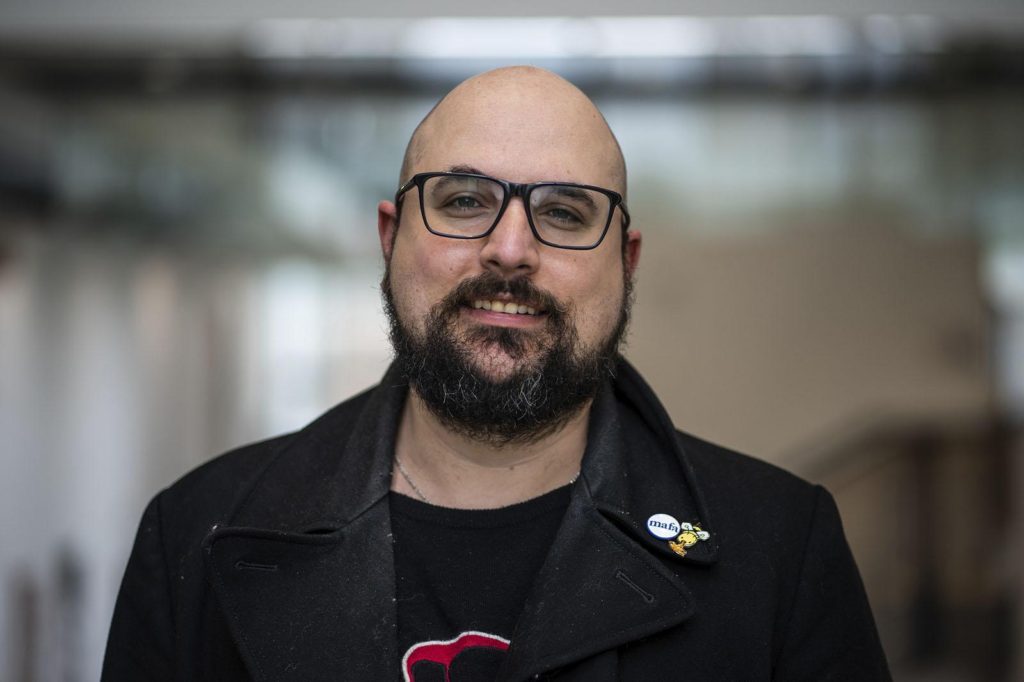
A Mount Allison researcher is continuing his work exploring possible causes of unexplained neurological symptoms that have been noticed in New Brunswickers over the past 8 years, and also backing the latest call for the federal and provincial governments to formally investigate.
Dr. Matthew Betti is a Mount A professor of math and computer science who specializes in modeling disease spread. Last year, he started a research survey to help narrow down possible causes or circumstances related to the over 200 people who are reportedly suffering from an atypical, unknown neurological disease in the eastern parts of New Brunswick. And last month, he signed his name to an open letter written by Moncton medical student James Paddle, calling for an immediate public health investigation.
Paddle studied and later did a work placement with Dr. Alier Marrero, the neurologist who first identified patients with atypical neurological symptoms. Up until May 2021, Marrero’s work was being supported jointly by New Brunswick Public Health and Public Health Canada. But then, New Brunswick cut ties with Public Health Canada, and appointed a steering committee to review the cases they had on file, which had been capped at 48. That committee later concluded that most of the 48 cases were actually attributable to known causes, and New Brunswick Public Health closed the investigation.
But Marrero has continued to see more and more patients which he says have sets of symptoms he can’t explain. Paddle says the number of patients is up to over 200 and the cases appear in clusters throughout eastern New Brunswick, including some cases in the Tantramar region. Patients include people of all ages, even teenagers, and according to Paddle, urine tests of those patients have returned results showing well-above detectable amounts of glyphosate and other pesticides. He also expresses concern that BMAA, a bacteria present in blue-green algae, could be related.

Matt Betti is also interested in potential environmental causes of the unknown disease, but his approach to the problem appears to be in contrast to that of New Brunswick Public Health. Instead of capping case numbers at 48 and looking at just those cases, Betti has cast a wider net. His research survey is open to anyone, including people who might not be experiencing anything strange, who will serve as a control group. The idea is to hear from as many people as possible across the province, in the process capturing the hundreds that are experiencing unexplained sets of symptoms.
But uptake of the survey has been slow. Betti has about 50 respondents as of July, and about 26 of those have reported symptoms fitting the profile first put together by Marrero and colleagues in January 2021. Betti says he’s not that surprised at the slow uptake. “I knew it was going to be tough to get people,” says Betti. “A grassroots approach takes a long time. Grass takes time to grow.”
“We’re talking about people who the system has abandoned very publicly,” says Betti, referring to New Brunswick Public Health’s closure of their investigation. “They’re probably burned out and they probably don’t want to go through any sort of anything again.”
And Betti is clear that his study won’t solve the mystery in one fell swoop. “It probably won’t pinpoint a cause,” says Betti, but with enough data from enough people, “we could probably determine whether this is environmental, whether it is a one factor thing or multifaceted problem.”
“Personally, I’m not sure there is one silver bullet. I think there’s a lot of environmental testing and regulation that doesn’t happen in New Brunswick. And I think it’s possible we’re seeing the bubbling effects of all these things failing,” says Betti.
Betti says that with a study like the one he’s conducting, the more the merrier. But even with 50 respondents, 26 of whom report symptoms matching the case definition, he’s observed some things. The ages of those reporting is spread out, with a bump in those between 30 and 50 years of age. And there appears to be a geographical concentration in eastern, and mostly northeastern New Brunswick. “There’s nothing weird happening in the rest of the province,” says Betti. “The people that we’ve spoken to tend to be located either by bodies of water or in areas of heavy forestry. Which is why I say it seems like a multi-faceted problem.”

Betti says he’s hoping to get more respondents for his research survey, which could help identify patterns and theories that could be further explored with other testing. And he says on top of better participation in his survey, there’s a lot of other work to be done, most of which involves government action.
“You need to be testing waters, and testing people for things like viral encephalitis. You need to know what a baseline glyphosate level in the bloodstream is. We need to know if people who are experiencing these things have elevated levels of that. You need to know which bodies of water they’ve frequented, and you need to be doing regular testing on those bodies of water, to make sure that there’s no toxic algae in there. There’s a ton of work that needs to be done mostly in environmental testing… There’s so much to be done, and there’s so little buy in to do it,” says Betti. “It kind of grinds thing down to a halt.”
New Brunswick Public Health did respond recently to a request from Dr. Alier Marrero, and has requested the help of two federal epidemiologists to complete the extensive reporting required for the growing number of patients referred to Dr. Marrero. That work is expected to happen in early September. Memramcook-Tantramar MLA Megan Mitton says he is hoping the exercise is not designed to dismiss the concerns raised by Marrero, but rather help get to the bottom of what is adversely affecting so many people.
“It’s hard to understand why there’s such resistance to science and to data,” says Mitton. “Why would we not be doing everything possible to get answers for these patients, for these families, and for other people who may become sick because we don’t really know what’s going on.”
Betti says the onus is on the provincial government to get involved with research, and that’s one of the main reasons that he decided to add his name to James Paddle’s open letter.
“The overarching theme of that letter is for further study. And that’s exactly what we’re trying to do,” says Betti. “One of the things that I learned from working with the Public Health Agency and with Health Canada during COVID was that think tanks work. You get a bunch of people with different expertise in the room and ask them to solve a problem, and it works.”
“And that seems to be something that’s not happening here. I think it’s starting to happen, but there’s a long way to go.”
Betti is casting a wide net for his survey, looking for anyone who has lived in or spent considerable time in New Brunswick over the past 20 years. The survey can be filled out online, on paper, or over the phone. To get the survey or find out more, email mbetti@mta.ca, with the subject line of NB Disease.
Further reading:
